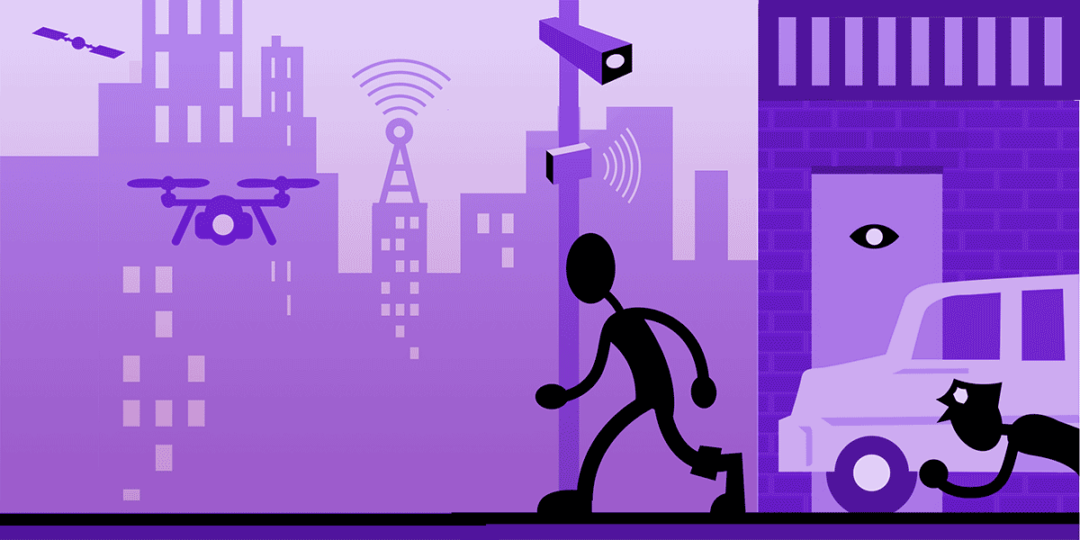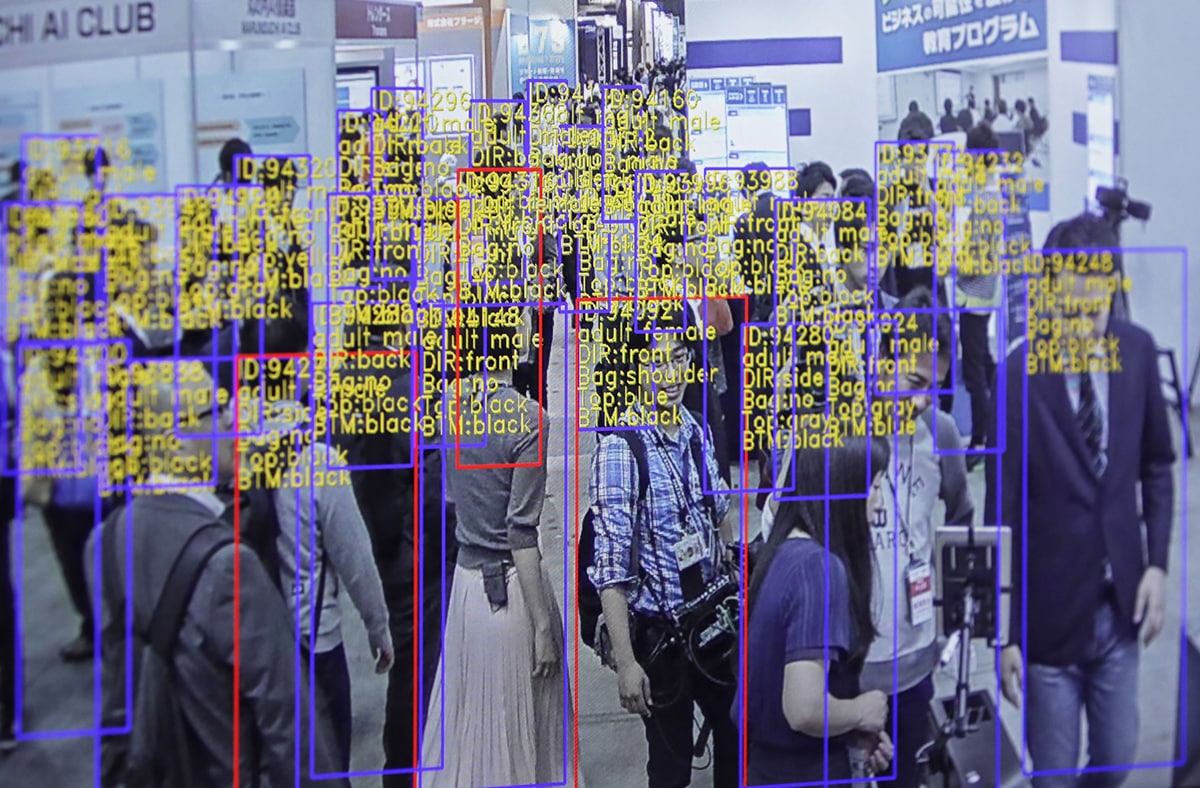

Neighborhood Watch Out: Cops Are Incorporating Private Cameras Into Their Real-Time Surveillance Networks
Police have their sights set on every surveillance camera in every business, on every porch, in all the cities and counties of the country. Grocery store trips, walks down the street, and otherwise minding your own business when outside your home could soon come under the ever-present eye of the government. In a quiet but rapid expansion of law enforcement surveillance, U.S. cities are buying and promoting products from Georgia-based company Fusus in order to access on-demand, live video from public and private camera networks.
The company sells police a cloud-based platform for creating real-time crime centers and a streamlined way for officers to interface with their various surveillance streams, including predictive policing, gunshot detection, license plate readers, and drones. For the public, Fusus also sells hardware that can be added to private cameras and convert privately-owned video into instantly-accessible parts of the police surveillance network. In Atlanta, Memphis, Orlando, and dozens of other locations, police officers have been asking the public to buy into a Fusus-fueled surveillance system, at times sounding like eager pitchmen trying to convince people and businesses to trade away privacy for a false sense of security.
The model expands police access to personal information collected by private cameras that would otherwise require warrants and community conversation. Because these cameras are privately owned, police can enjoy their use without having to create and follow records retention and deletion policies.
The Electronic Frontier Foundation has been collecting and reviewing documents about cities’ uses of Fusus, which counts nearly 150 jurisdictions as customers. You can access these records on DocumentCloud. EFF also shared these documents with the Thomson Reuters Foundation, which published its report today.
Police surveillance threatens constitutionally protected activities. It gives police the ability to surreptitiously spy on and track people of no real or alleged criminal concern. It creates caches of sensitive, personal information that can be retained indefinitely. Fusus is compounding these issues by expanding police access to surveillance cameras and integrating the cameras with a number of other surveillance services. This increases the ways police are able to record, track, and marginalize communities.
Deciding whether to expand police video surveillance to every corner of our lives should never happen without strong community conversation, transparency, and real respect for procurement rules and the public’s liberty. Yet cities’ responses to public records requests reveal a lack of clear guidance on when live access can be utilized, with very few locations able to provide policies regarding appropriate and specific police use of the system.
A Growing Web of Watchers
Fusus claims to be able to integrate camera feeds from nearly any source, including existing private and public camera networks, live streams from body-worn cameras, and Ring doorbell cameras.
Private entities like residents or business owners who want to give police access to their cameras can choose to “register” or “integrate” their cameras through Fusus. “Registered” cameras are added to a camera registry, and indexed for officers interested in knowing what video could be available in a particular location. For “integrated” cameras, private entities purchase additional Fusus hardware that connects to their existing surveillance camera set-ups and a monthly service subscription. Based on the camera owner’s settings, video feeds are available within the police network for quick access without requiring additional permissions to view real-time footage. Concerns about privacy and potential threats to civil liberties are sidestepped by claims that live access to footage is an “opt in” feature – but this means opt-in just for the camera owner and not the person recorded. Ownership of the cameras is not changed, but the video content is shared with police and retained by the Fusus system.
For cities using Fusus, there is a constant push to grow their network of accessible cameras, and in some places, that expansion is happening quickly. At a June 22, 2022 press conference, officers from the Atlanta Police Department claimed to have 3,166 registered and 5,798 integrated cameras. Just a year later, the city’s Connect Atlanta page claims to have more than tripled those numbers to 16,226 registered and 15,329 integrated cameras.
Fusus also enables its law enforcement customers to share live video feeds with other jurisdictions, as law enforcement officers in Atlanta have discussed doing with other agencies in the area. So your trip to the mall may not just be a subject of observation for your local police; you could also be part of a cross-jurisdictional video feed, in real-time or as part of a growing collection of stored footage. Police promoting Fusus have encouraged regional, not just local, adoption of its products.
Police officers have expressed their excitement over the unfettered access to surveillance cameras that gives them the ability to turn common spaces into dollhouses into which they can peer without warning or permission.
“We have cameras everywhere that we can see real-time what’s going on in all events. We can electronically take the roof off our stadium and see where all the officers are at,” Commander Bruce Folkens of the Special Crimes Division at the Minneapolis Police Department offered in a testimonial about Fusus. “If there’s a crowd control problem, the officer can literally live-stream what they are seeing to the command post here, so we can see what they are seeing inside the stadium when it’s happening.”
Real-time access to private cameras means that law enforcement officers have the ability to jump into video feeds from their computers and phones without a warrant. Police have previously used such networks to spy on protestors and perpetuate the long history of over-policing of activists and communities of color.
In one cautionary tale from San Francisco, the city used its live access to a business improvement district’s surveillance camera network to spy on protestors. EFF and the ACLU of Northern California filed a lawsuit, called Williams v. San Francisco, for this violation of the city’s Acquistition of Surveillance Technology Ordinance. EFF last year also opposed legislation to allow such real-time access.
Costs of Constant Surveillance
Real-time video access and storage come with ongoing financial and other costs, both for the police departments and the businesses they court.
U.S. cities have been spending millions of dollars to purchase Fusus products. Though these numbers vary, typical Fusus access can cost a police department $50,000 to $150,000 per year. In Dallas, where the work to integrate Fusus is ongoing, the estimated cost for three years will be nearly half a million dollars.
Funding for the Fusus system is coming from multiple sources, including civil asset forfeiture funds and COVID relief grants awarded through the American Rescue Plan (ARPA).
Throughout the adoption efforts, police frequently market the Fusus product to businesses and homeowners. A number of cities have promoted websites designed by Fusus with the intention of making it easy for the public to purchase Fusus equipment and subscriptions. These pages, whether in Memphis, Atlanta, or Volusia County, follow a nearly identical template and claim to track the number of registrations and integrated cameras in the city. Police, in press conferences and marketing materials, actively encourage the public to buy into the Fusus system, which can cost hundreds of dollars in hardware and subscription costs each month. In Atlanta, officers have repeatedly told the public that it could be “integrating your cameras at a relatively low cost.”
Integrating with Other Surveillance Technology
Fusus wants to be the main surveillance interface for police officers. Gunshot detection systems, video analytics, license plate readers, predictive policing, and other surveillance equipment can all have a place within the Fusus systems, according to the company.
The stated goal is to bring as many means of surveillance as possible under “one pane of glass” for law enforcement. Fusus has dozens of add-ons and possible integrations through partnerships with companies like SoundThinking (the umbrella company for ShotSpotter), Geolitica (formerly PredPol), Vigilant Solutions, and Axon. ShotSpotter integration, for example, can mean that “gunfire detection alerts activate private and public cameras connected to the Fusus system.”
Axon, most commonly known for their TASER devices and body-worn cameras, has poured at least $21 million into Fusus and has embraced its Fusus partnership as part of its strategic expansion efforts. The Fusus system provides live access to footage from officers’ Axon Body 3 cameras. Some cities have purchased Fusus and Axon as a package. In Austell, GA, Axon’s integration with Fusus was used as a reason for it to be considered a sole source provider, allowing it to avoid competing in the usual procurement and bidding process.
Community Control
Community Control Over Police Surveillance (CCOPS) ordinances empower a community’s residents, through their elected officials, to decide whether law enforcement may implement surveillance programs in their neighborhoods. These types of policies help to protect residents from unwarranted surveillance, facilitating community conversation and establishing processes by which police can seek to use these technologies, and if so, under what safeguards and reporting.
Communities should ask whether systems like Fusus actually reduce crime. There is cause for doubt. In Detroit, the National Institute of Justice studied a similar private-public program, Project Green Light, which also facilitated live police access to businesses’ cameras. The study found that while property crimes went down in some areas with cameras, the rate and clearance of violent and other crimes was not positively affected.
Before communities decide whether to adopt Fusus and other companies that enable police surveillance, they should subject Fusus to the kind of scrutiny and public oversight that CCOPS ordinances enable.
If a community adopts Fusus, police officers should be required to have at least reasonable suspicion of crime before accessing historical footage from private cameras. Likewise, there should be strict limits on how long police may retain footage gathered from private cameras. Further, there must be an audit trail; the Buncombe County Sheriff’s Office requires officers to log their access, and reasons for doing so, followed by auditing of such access. In short, there must be robust oversight and accountability rules that can help protect the public against abuse of any state surveillance system.
Community efforts in Columbia, MO, resulted in the City Council rejecting Fusus, and considering a CCOPS ordinance. Since then, the police have submitted a draft policy for Fusus use, and the city is now reconsidering the product.
Some communities will choose not to use Fusus, based on concerns like the ones above. Police surveillance, conducted by public employees or via private entities, can undermine and violate important rights meant to protect free expression, privacy, and equality under the law.
Whether or not a city has a CCOPS law, the police and the city must comply with public records, open meetings, and other applicable transparency laws. The decision to deploy a threatening technology like Fusus must not be made behind closed doors by a police chief and a company salesperson.





0 Comments